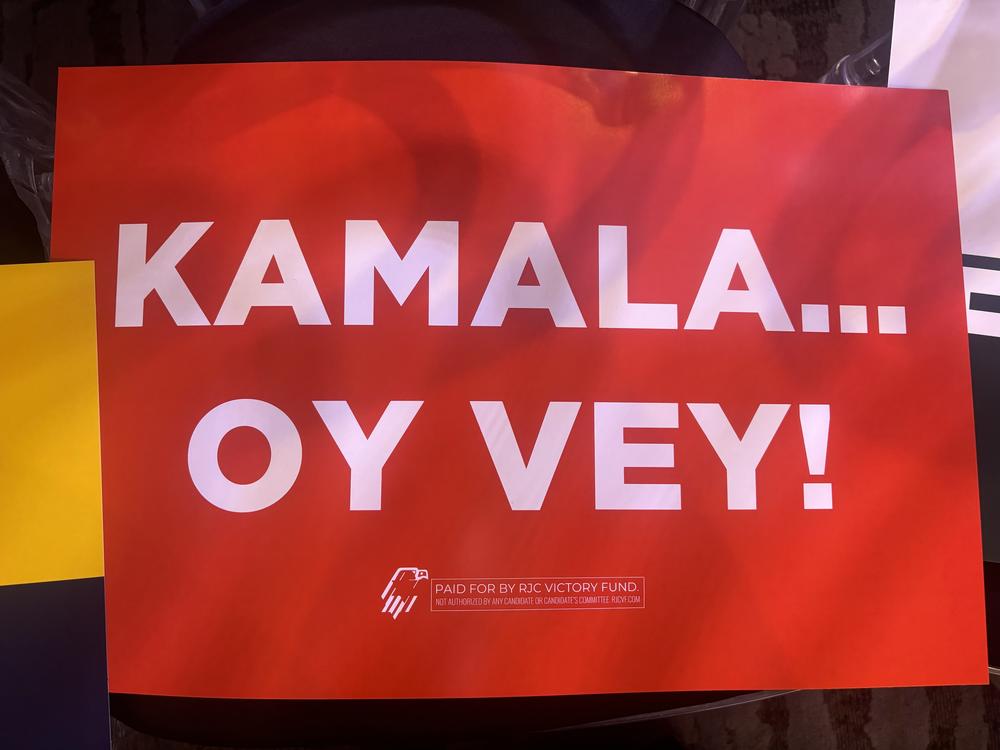Section Branding
Header Content
As war in Gaza fractures Democrats, Republicans see an opening with Jewish voters
Primary Content
Jewish voters have been a reliable voting bloc for Democrats for decades, but the war between Israel and Hamas has complicated that relationship.
As Vice President Kamala Harris faces continued pressure from progressives in the Democratic Party to cut off military aid to Israel, some Republicans see an opportunity to win over Jewish voters in key states.
“Israel is in, literally, the fight for its existence,” former Minnesota Sen. Norm Coleman, now the national chairman of the Republican Jewish Coalition, told a room of supporters at a country club in suburban Detroit on Monday. “The existence of the Jewish state is at risk today — both in terms of war and battle … as well as what happens in the United States in terms of whether our support is there unequivocally or whether folks are gonna step back.”
Some in the audience wore red kippahs — a symbol of their Judaism — with the word “TRUMP” printed on one side.
Sheila Weissman, from nearby West Bloomfield, stood outside the event clutching several yard signs, including one that read “Kamala — Oy Vey.”
“It’s been a tepid response at best by this administration,” Weissman said about antisemitism in the aftermath of the Oct. 7 attack on Israel by Hamas-led militants. The attack killed 1,200 people in Israel, according to the Israeli government. Israel's military response has killed at least 43,000 Palestinians in Gaza, according to the Gaza Ministry of Health.
As a swing state voter, Weissman said she’s concerned about war in the Middle East and antisemitism at home.
A report released by the Anti-Defamation League — using an expanded definition of antisemitism to include some anti-Zionist language — found a record number of those types of incidents in the year since the Hamas attacks, including thousands surrounding left-wing anti-Israel demonstrations.
Weissman said she thinks those realities could reshape voting patterns among Jewish Americans, who’ve historically sided overwhelmingly with Democrats.
“October 7th changed things,” Weissman said. “The things that happened in this country on college campuses, I mean, it's just really terrifying.”
Weissman has heard the claims that former President Donald Trump has condoned antisemitic rhetoric. But she thinks his words are sometimes taken out of context. And she likes his record on Israel, including his decision to move the U.S. Embassy to Jerusalem.
The RJC is investing $15 million in the 2024 campaign, in an effort to win over Jewish voters in swing states through ads, canvassing and other outreach. The group is highlighting Trump’s record of support for Israel, including efforts to normalize relations between Israel and some of its Arab neighbors through the agreement known as the Abraham Accords.
RJC CEO Matt Brooks says it’s the organization’s largest investment in a campaign ever, in part because he sees this year as a likely “inflection point” for Jewish voters.
Loading...
Many Jewish Democrats are still supporting Harris
Michigan State Sen. Jeremy Moss, a Jewish Democrat, says Jewish voters are concerned about antisemitism across the political spectrum, but he believes they ultimately will support the Democratic nominee as most have in the past.
“Kamala Harris has held the line against these extreme voices that spout off antisemitism when discussing this Israel conflict on the far left right now,” Moss said.
Moss — who has criticized Michigan Rep. Rashida Tlaib, a fellow Democrat, over her remarks about Israel — said Harris has struck the right tone when it comes to the conflict. Harris has repeatedly said she believes Israel has a right to defend itself from threats across the region, and has called for bringing Israeli hostages home and protecting Palestinian civilians.
“But then you look at the other side and Donald Trump platforms anti-Semitic extremism in the Republican Party on the far right,” Moss said.
Moss said most Jewish voters also align with Harris on other key issues, including abortion rights — which has become a major focus of the Democrats’ closing message to voters across the country.
Recent polls from the Jewish Democratic Council of America suggest those numbers are holding steady. But some others, including one from the conservative Manhattan Institute, suggest what the organization’s report characterized as “growing cracks in that support.”
Alan Cooperman, director of religion research at the Pew Research Center, says small religious groups are difficult to poll accurately.
“I think honestly, nobody knows,” he said. “Nobody knows whether the Jewish vote is different in this election from past presidential elections.”
Jews make up only around 2% of the United States population, but many live in swing states including Michigan, Arizona and Pennsylvania — and even small groups can make a difference in a close election.
At a Harris campaign event on Monday in the critical state of Pennsylvania, second gentleman Doug Emhoff reiterated the vice president's commitment to supporting Israel and fighting antisemitism. Emhoff, who himself is Jewish, reminded the crowd of the anniversary this week of the deadly mass shooting attack on a Pittsburgh synagogue in 2018.
“When Kamala is President, she will continue to stand with Israel and with the Jewish community — our community,” Emhoff said. “She will reject anti-Semitic hate and the notion that Israel does not have the right to exist.”


